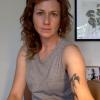You Are Such Demanding Work: Repetition and Choral Voice

In her collection No Knowledge Is Complete Until It Passes Through My Body, Asiya Wadud frames history as ephemeral, porous and deadly serious. Rooted in shared histories of oppression, Wadud’s collection places her body and personal experience as a framework through which she feels her way through violent histories and personal journeys of recovery and care. Wadud uses the strategies of repetition and choral voice to link poems and perform an ethical attention from which we can all learn.
Wadud models a lyrical journey that collapses historical time. The poet’s ferry commute across the Hudson River intermingles with imagery of refugee rafts crossing the Mediterranean and with ships transporting the enslaved across the Middle Passage. Wadud places a collective, lyrical voice at the heart of her poems, for example in “the order was in the hour of worship”:
we existed at the margins of the coda
we exited the ocean
all ovum rendered worthless
all ovum meritocratic
nothing else but progeny
no map yet governs us
thus no map
governs
our journey
I am etching anything
in whatever substance remains viscous
Here, where maps don’t yet exist, where directions are still fluid, the speaker’s own writing is not a static monument. Wadud shows how to use the choral voice of “we existed” alongside an authorial “I am etching” by employing repetition and varying line lengths. The stanza’s lines expand with a choral “we,” then shutter into “governs,” before they open again to an individual expression. Words such as “the order” travel between meanings as they are repeated, at once evoking a religious sect and an organizing principle:
the order was vested in the red moon
the order was in the hour of worship
how threadbare this trinity —
Wadud’s language circles her subject through repetition of words and syntax. In “on the structure of birds,” she poses a series of questions: “Can you read a map? Who taught you that the good north was that? Can you spell fatal to map an abiding passage?” The anaphoric interrogation builds:
This is some newness I’m catching to rectify the loss. Who told you this semblance should be named language? Who wrought this, some small god lingering in stillness, some prophet twice disposed, some dirty fingernails, some of the ransacked. Who told you once bitten now the baby’s shy?
Language, like knowledge, has to twist, flail, get mixed up, and pass through our bodies as we read the book. The poem “yucca brevifolia: field notes from an ellipse” repeats images, rather than syntax or form. The sense of intimate understanding of the speaker’s vulnerability grows through images such as frigate birds, pothos house plants, and dinner rituals.
No Knowledge Is Complete Before It Passes Through My Body offers lessons in how to craft a collection in which poems speak to each other, to the current world and to our histories of oppression. Both delicate and gritty, the poems hold an intimate understanding of how to live in paradox while disentangling boundaries. The poems also function as an invitation.
In “attention as a form of ethics,” Wadud repeats “let’s” several times, both as a summons and directive.
let’s dissect what it means to mourn
let’s look at all the desiccant and what’s left
little exoskeleton bareback
how the straight line can become apparent
how the likeness is a labile breeze
let’s talk about shame
The form of attention this poem advocates is to turn our gaze onto histories that are difficult to engage with because they’re painful, because we’re implicated, because they aren’t going away.
let’s reckon with the past
the logic
the Middle Passage
the hull
the tenderness
you are such demanding work
The communal and choral are woven throughout No Knowledge. Wadud’s collection places poems in dialogue by repeating diction, syntax and imagery. This attention is not just affective, but ethical in a world carrying the weight of present-day and historical oppressions, genocides, and enslavement. Perhaps what knowledge becomes once it has passed through a body is collective and resonant—a chorus, a chant, a spell.
